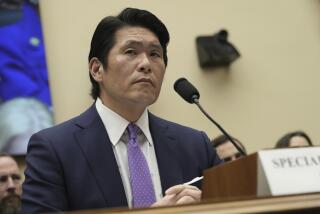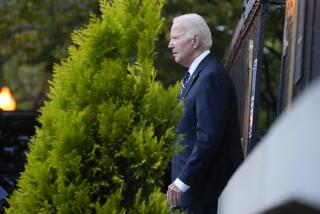Bush urges ‘wait and see’ on CIA tapes
- Share via
WASHINGTON — President Bush said Thursday that he did not know about two CIA interrogation videotapes until the spy agency’s director recently told him and said he would defer judgment about their destruction until administration officials completed their investigations.
Speaking publicly for the first time about the most recent controversy over the administration’s handling of terrorism suspects, Bush said he was confident that the inquiries would “end up enabling us all to find out what exactly happened.”
The Justice Department’s national security division is conducting a criminal inquiry with the CIA’s inspector general, while the House Intelligence Committee has launched its own investigation.
“Let’s wait and see what the facts are,” Bush said.
At the same time, he defended CIA operatives and others dispatched to undercut terrorist operations: “We’re asking people to do hard things, for starters, which is intercept and find terrorists and to spread freedom.”
Bush’s comments came at a year-end White House news conference, at which he offered a kinder view of Congress than he had in many weeks, spoke of the nation’s economic resilience and defended his administration’s decision to deny California permission to regulate vehicle greenhouse-gas emissions.
Insisting that he takes the threat of global warming seriously, the president endorsed the Environmental Protection Agency decision announced a day earlier to deny California permission to set its own course to restrict the gases most blame for rising temperatures.
He said his administration was pursuing a “more effective” national strategy, and suggested that the energy bill he signed Wednesday reduced the need for action by individual states.
The new law requires an increase in vehicle fuel economy.
Bush sent a two-pronged message to lawmakers: He praised them for passing the energy bill and legislation to fund the federal government for the coming year, but disparaged them for waiting until the last minute and lumping the spending bills into one package.
“When Congress wastes so much time and leaves its work to the final days before Christmas, it is not a responsible way to run this government,” he said.
He also noted in his opening statement that congressional leaders campaigned last year “on a promise that they would curb earmarks.”
They made progress, he said, but not enough.
He said the $550-billion budget bill that Congress completed this week contained 9,800 such projects. Bush said he had instructed Jim Nussle, the director of the Office of Management and Budget, “to review options for dealing with the wasteful spending.”
But the president begged off a chance to trumpet his victory over Democrats, who failed to make military funds contingent on withdrawing troops from Iraq.
“I really don’t sit here and say, well, you know, ‘He won, they lost,’ or ‘They won, he lost’ -- it’s just not my nature -- because I think what ended up happening was good for the country,” he said. “I think it’s good that we funded our troops without an artificial timetable for withdrawal.”
Bush sounded an optimistic note on the nation’s economy, but did not rule out taking measures to forestall a recession. “My view of the economy is that the fundamentals are strong,” he said, but added, “In terms of further stimulation, we’ll consider all options. So we’re watching carefully.”
Bush acknowledged trouble in the housing market, but said he was unconcerned that at least three Wall Street firms had accepted cash infusions from foreign governments as they have written down mortgage-caused losses.
“I don’t think it’s a problem,” he said. “I think what would be a problem is to say we’re not going to accept foreign capital, or we’re not going to open up markets, or we’ve become protectionists. Protectionism would be a huge mistake for this country.”
Bush urged Wall Street to hasten the process of identifying losses: “Put it all out there for everybody to see. If there are some write-downs to be done, they need to do it now.”
Critics have accused Bush and his administration of failing to do enough to alleviate the sub-prime mortgage crisis.
This month the administration announced a plan designed to minimize foreclosures and to speed the refinancing of troubled mortgages.
“We’re not going to bail out lenders and we’re not going to help speculators. But we will help creditworthy people stay in their homes,” Bush said.
The disclosure two weeks ago that the CIA had destroyed videotapes of secret interrogations of two key terrorism suspects was the most recent scar on the administration’s campaign to fight terrorism, following the mistreatment of prisoners at the Abu Ghraib prison in Iraq and questions about the methods used in interrogating suspects, particularly in secret prisons.
CIA Director Michael V. Hayden, acknowledging the tapes’ destruction, said in a message to the CIA workforce that they had been destroyed in 2005 after they were determined to no longer have intelligence value or be “relevant to any internal, legislative or judicial inquiries.”
The day the destruction was revealed, White House Press Secretary Dana Perino said that Bush had been informed that morning by Hayden about their existence and eventual destruction, and that the president had no recollection of having heard earlier about the tapes.
To a reporter’s statement that the White House response seemed ambiguous, Bush said: “It sounds pretty clear to me when I say I have -- the first recollection is when Mike Hayden briefed me. That’s pretty clear.”
--
james.gerstenzang@ latimes.com
More to Read
Get the L.A. Times Politics newsletter
Deeply reported insights into legislation, politics and policy from Sacramento, Washington and beyond. In your inbox twice per week.
You may occasionally receive promotional content from the Los Angeles Times.










